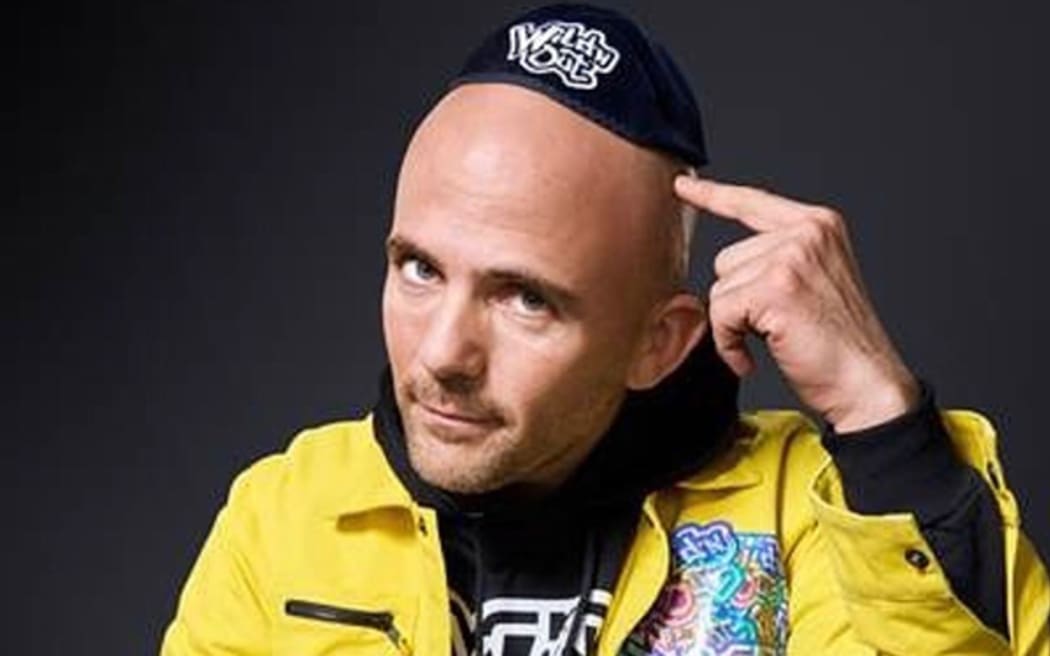
Kosha Dillz raps in English, Hebrew, Yiddish and Spanish. Photo: Supplied
Taking shots at other rappers wasn't Rami Even-Evsh - aka Kosha Dillz' style. But when Kanye West (now known as Ye) made repeated anti-Semitic outbursts, the Jewish hip hop artist rhymed back.
“Sometimes you got to go tell some people to go screw themselves and just put on a record," Dillz told Culture 101.
Dillz’ song ‘Death Con 3 (Kanye West Diss)’ responds to Ye’s vow to go “death con 3 on Jewish people.”
His dis of Kanye was not particularly his thing up to that point, he says.
“Great rapper, loved his music. As a person, I knew that he was not necessarily a good person through other people that I knew that worked with him.
“And he obviously said some outrageous stuff.
“So, I just did it, we shot the video, we released it in one day called Death Con 3 (Kanye West dis) and, you know, got millions of views on Twitter.”
Born to Israeli immigrant parents in New Jersey, Dillz isn’t the first Jewish New Yorker to embrace hip hop.
Yet, rapping in English, Hebrew, Yiddish and Spanish he’s made Jewish identity and culture central to his work. This at a time when anti-Semitism has been on the rise.
Dillz is five albums in and has toured with everyone from Ghostface Killah to Snoop Dogg.
This month he finds himself in quite a different setting: Remuera, Tamaki Makaurau for Limmud, an annual festival of learning.
Limmud sees the Jewish community, orthodox and progressive, gather for a rich banquet of international speakers exploring contemporary Jewish
Dillz got his name when he was 17.
“It was really a euphemism, everyone was yak balls. I was Kosha Dillz, it was like a Jewish reference, it was like a hustling reference. And it was also an American pickle reference, those who don't know, a pickle, or former cucumber, Kosher dills is a kind of like a Jewish food.
“And so, it sort of represented my culture and everything encompassed in one and because I have the name Rami, which is also an Arabic name and people could get confused to where I'm actually from."
Hip hop became a way to express himself.
“In more of a personal way, I would say, my personal wars, I come from addiction and I come from a lot of like dark, I would say, depression, anxiety and definitely an addictive personality.
“And that's outside the Jewish world. And I think that really was sort of my journey of just like finding... in a way to get stuff out of me that I couldn't seem to communicate otherwise.
“Hence why I turned to drugs and alcohol for a long time.”
Being good at what he does is bridge-building, he says.
“I'm on a television show called Wild ‘N Out, I'm the Jewish rapper on that show, I work with another Israeli artist and we have a connection on that show, we get to do things together.
“That makes us look good in a culture that's not ours, that we're a guest in, right?
“Wild ‘N Out, it's like the most successful television show, I would say and longest-running in the world, besides maybe the Cosby Show, and a few others.”
New Jersey, where he grew up, was culturally diverse.
“We were the Israeli family. My friends were Chinese, Puerto Rican, black, Persian. One kid was Jewish, my other friend became a pastor. So, we were literally like, the sandlot of people from different places.”
His friend introduced him to rap battles.
“It was epic, it was the time of like Eight Mile and when you watch that Eminem movie, and that was exactly what was happening in New York. And I started rapping to impress all my friends, was a great way to just get to stuff out of my brain.
“I loved it, I loved performing.”
He lived near Staten Island, home of Wu Tang Clan.
“So, there was one Jewish guy named Remedy that had a song about the Holocaust and it was like, wow, this guy just sold a million records rapping about Jewish stuff. And that was someone you looked at, and you're like, whoa, maybe I could do something really influential.”
He talks to people around the US about his struggles with addiction, he says.
“It's called from Jails to Judaism. For me, it's basically, like most addicts, we hate something about ourselves, we want to shun certain parts of our life, we have a lot of shame, we're going through a lot of trauma, right?”
He’s been clean for almost 20 years now, he says.
“I've helped a lot of other people just by putting my stuff out there and inspired others and that's sort of like a Jewish story of resilience and people were identifying with it.”
And he has come to reconnect more strongly with his culture, including the language.
“I met more Jewish people, travelled to Israel, lived there, started really recommitting myself to speaking Hebrew.”

